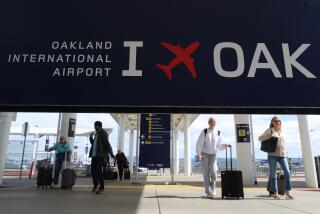Burbank Airport Noise Exemption Defended : Transportation: An attorney for the facility says during a hearing that sound levels have fallen significantly. The head of a residents’ group disagrees.
- Share via
Saying extraordinary strides have been made to reduce noise, an attorney for Burbank Airport defended the facility Monday at a hearing to determine whether the airport can continue operating under an exemption from state noise standards.
The hearing, scheduled to continue through Thursday, is being held by the California Department of Transportation at the request of a coalition of homeowners south of the airport that has long complained about airport noise.
The airport exceeds state noise standards over a 350-acre area of residential neighborhoods surrounding the airport, said airport spokeswoman Elly Mixsell.
Administrative Law Judge Richard J. Lopez presided over the hearing to determine whether to renew the airport noise variance, a Caltrans permit allowing the airport to operate without meeting state noise limits imposed on all airports. Without the permit, Burbank Airport would have to close.
Virtually all major airports in the state have such permits, their managers arguing that it is not technically or financially feasible to meet the noise standards. In about 25 variance renewal hearings held since the state’s airport noise law went into effect in 1975, the variance has been granted in all cases, though sometimes judges have required airports to increase efforts to meet the standards, a Caltrans spokesman said.
The hearing was requested by the East Valley Airport Impacted Communities Coalition. The city of Los Angeles, which has for years battled the airport on noise issues, is also taking part, with the city attorney’s office backing the homeowners’ complaints.
Tom Paterson, the coalition’s chairman, said he hopes that the hearing will force the airport to more evenly spread the noise by directing more takeoffs to the east, over the cities that own the airport, and away from L. A. neighborhoods to the south.
Airport managers in the past responded to that argument, which noise opponents have been making for years, by saying that federal regulations give pilots--not the airport--authority over takeoff decisions, and that pilots usually choose the southbound direction because the nearby mountains, prevailing winds, runway layout and air-traffic control factors make that the safest choice.
The coalition also wants the airport to pay for soundproofing residences in noise-impacted L. A. neighborhoods, Paterson said.
During opening statements, Richard Simon, an attorney for Burbank Airport, displayed records of noise readings that indicated that the residential areas exposed to noise levels classified as excessive--as defined by a commonly used statistical measurement--have shrunk significantly.
“It shows a noise contour which has decreased over the years,” he said. “That in itself stands as an extraordinary achievement.”
Simon credited much of the decrease in noise to the airport’s success in getting airlines that operate at the facility to voluntarily restrict themselves to using only planes with “Stage Three” jet engines, the quietest available.
“Real noise reduction can occur at a modern airport without state-imposed conditions,” he said.
But Paterson disagreed, saying the noise from the airport is not on the decline. “Noise impact problems have not decreased, in contrast to the statistical data you may hear,” he said. “The impact on the lives of the people around the airport continues to grow.”
Keith Pitsker, an L. A. deputy city attorney, acknowledged that the airport has made some progress to reduce noise, but added, “we think a lot more can be done.” During a hearing break, Pitsker said he will urge that Lopez require the airport to install soundproofing in residences exposed to excessive noise.
The airport has overseen the soundproofing of one school and is in the process of soundproofing another. Airport officials have said that was done with the aid of federal funding, but have no such funds to soundproof nearby residences.
More to Read
Sign up for Essential California
The most important California stories and recommendations in your inbox every morning.
You may occasionally receive promotional content from the Los Angeles Times.











